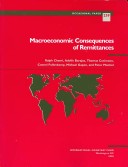Aggregate remittance flows total billions of dollars annually, and therefore can be expected to have significant macroeconomic effects on the economies that receive them. This paper reports on the first global study of the macroeconomic effects of remittances and directly addresses the two main issues of interest to policymakers: how to manage their macroeconomic effects and how to harness their development potential. In broad terms, the paper confirms the main benefit cited in the microeconomic literature: remittances improve households' welfare by lifting families out of poverty and insuring them against income shocks.The paper also yields a number of important caveats and policy considerations, however. The main challenge for policymakers in recipient countries is to design policies that promote remittances and increase their benefits while mitigating adverse side effects. Globalization and the aging of developed economy populations will ensure that demand for migrant workers remains robust for years to come. Hence, the volume of remittances likely will continue to grow and, with it, the challenge of unlocking the maximum societal benefit from these transfers. Putting in place effective policy prescriptions is imperative.
- ISBN13 9781589067011
- Publish Date 28 February 2009
- Publish Status Active
- Publish Country US
- Imprint International Monetary Fund (IMF)
- Format Paperback
- Pages 84
- Language English
